Matthew 27:51a – And behold, the curtain of the temple was torn in two, from top to bottom.
As we mentioned in our last post, God gave three incredible signs at the time of the death of Jesus. These signs proved that Jesus was not a common criminal or a mere man who was unjustly sentenced to death. The signs were a witness that Jesus was exactly what he claimed to be – the Messiah, King of the Jews.
The first sign was the unexplainable darkness that overshadowed the land from noon until the death of our Savior at 3 pm. This sign was a testimony to all that were at the crucifixion that day – Jews and Gentiles alike. The Light of the World was leaving, so the world was left with only darkness.
The second sign, the tearing of the temple curtain, was a very powerful sign sent specifically to the Jewish people.
What curtain is Matthew referring to?
When we read about the construction of the very first tabernacle (the original movable temple), we are told that God required a curtain or veil to separate the Holy Place from the Most Holy Place:
Exodus 26:31-33 - And you shall make a veil of blue, and purple, and scarlet, and fine twined linen of skillful work: with cherubim shall it be made: And you shall hang it upon four pillars of acacia wood overlaid with gold, and the veil shall divide unto you between the holy place and the most holy.
The Holy place contained the candlestick, the altar of incense and the table of showbread. Priests entered this room multiple times every day to perform their duties. These included trimming the candle wicks, filling the oil, burning incense, cleaning up/removing ashes, etc. The bread on the table was removed and replaced with fresh bread once a week. So this room was visited frequently.
The inner room, or the most holy place, contained the Ark of the Covenant.
The lid on the Ark of the Covenant had two angels (one on each end) which faced each other, with their wings stretched out over the ark. The Mercy Seat, or the place where God's presence dwelt, was underneath the wings of the two angels (Exodus 25:17-22):
Exodus 25:22 - And there I will meet with you, and I will commune with you from above the mercy seat, from between the two cherubim that are upon the ark of the testimony.
Unlike the Holy Place, the Most Holy Place (the very presence of God), could only be accessed once a year, and only by the high priest, who was there to make atonement for the sins of the people. At that time, it was a fearful thing to go into the presence of God. If the high priest did something wrong as he atoned for his own sin, he would be struck dead when he entered God's presence, because sin cannot exist in the presence of God.
So the purpose of the temple curtain/veil becomes apparent. It separated or kept men from accessing the presence of God, where their sin would destroy them.
From the time Israel became a nation, until the death of Jesus, 99.99999% of the men (and 100% of the women and children) had absolutely NO access to the presence of God. The few that did went into that room with fear and trembling.
But all that changed with the rending of the curtain. What exactly occurred as the curtain was torn?
Jesus himself, our great High Priest was entering into the Most Holy Place!
Hebrews 9:12 – He [Jesus] entered once for all into the holy places, not by means of the blood of goats and calves, but by means of his own blood, thus securing an eternal redemption.
He did not enter into the holy places with the blood of animals like other high priests, but he entered through his own atoning death on the cross:
Hebrews 10:20 - ...by the new and living way that he [Jesus] opened for us through the curtain, that is, through his flesh...
Jesus entered into the Holy of Holies and made atonement for us with his own blood, once and for all – no other blood sacrifice has ever been needed! Because of what Jesus did, we may freely and confidently enter the presence of God ourselves!
Hebrews 4:16 - Let us therefore come boldly unto the throne of grace, that we may obtain mercy, and find grace to help in time of need.
As Jesus tore that curtain, the door into the kingdom of heaven was fully opened. It will remain open throughout the dispensation of grace. Anyone who chooses to do so may enter in, through the sacrifice of Jesus:
John 14:6 – Jesus said to him, "I am the way, and the truth, and the life. No one comes to the Father except through me".
Do you fully comprehend how astonishing this is? You – a sinful, fallen member of humanity – may enter into the very presence of your creator, God Almighty! You may enter his presence and actually live! You may approach his throne to fellowship and commune with Him! You may bring your petitions and problems, your questions and desires straight to God! This is a privilege that millions of human beings never had – so don't take it lightly! Take advantage of it. Love it, rejoice in it, wallow in it – visit God every moment of every day!
But wait – there's more! Prior to this, you had to be a Jew to be one of God's children; the door to the family of God was closed to everyone else. So by tearing or destroying that curtain, Jesus was opening the way for Gentiles to also become the children of God. He was ripping apart/removing the wall of distinction between the Jews and the Gentiles. Now there is ONE, united holy family of God!
But wait – there's still more! By tearing or destroying that curtain, Jesus was destroying the ceremonial law. As Jesus indicated during the last supper, the Jewish temple service was now obsolete. Men were no longer needed as a 'go between' for people to reach God. Each man, woman, boy and girl can speak directly to God.
Now, under the new covenant, WE have become the priesthood of God!
I Peter 2:9 – But you are a chosen race; a royal priesthood, a holy nation, a people for his own possession, that you may proclaim the excellencies of him who called you out of darkness into his marvelous light.
We now have the privilege of declaring to others the mercies of God, and the ability to lead them to the kingdom of heaven through the open door of Christ Jesus.
Matthew 27:51b-53 – And the earth shook, and the rocks were split. The tombs also were opened. And many bodies of the saints who had fallen asleep were raised, and coming out of the tombs after his resurrection they went into the holy city and appeared to many.
The third sign is also very extraordinary. When Jesus gave up his spirit, there was a violent earthquake, which was so powerful, it split the rock around Jerusalem.
Scholars see a number of lessons in this event.
First, it proves the horrible wickedness of those who unjustly crucified Christ. They point out that the earth was cursed when it was forced to accept the blood of Abel, who was murdered by his brother Cain (Genesis 4:9-12). In their opinion, the earthquake was a sign of rebellion; the earth was saying that it did not want to accept the innocent blood of Christ, which was much more precious than that of Abel.
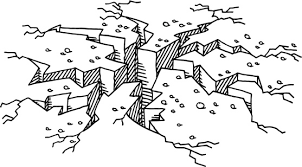 Second, many see the earthquake as evidence of the final, official defeat of the devil's kingdom. The Messiah had come, and despite all the powers of hell, he was victorious. Jesus had remained true to the Father, overcome temptation, taken the sin of all mankind upon himself, and brokered the new covenant between God and man. Satan was now a defeated foe and the earth was a herald of the final deathblow!
Second, many see the earthquake as evidence of the final, official defeat of the devil's kingdom. The Messiah had come, and despite all the powers of hell, he was victorious. Jesus had remained true to the Father, overcome temptation, taken the sin of all mankind upon himself, and brokered the new covenant between God and man. Satan was now a defeated foe and the earth was a herald of the final deathblow!
Third, Jesus once said that if the children would stop crying out 'Hosannas' of praise, that the rocks would cry out. Was this what was happening during the earthquake? Was the earth proclaiming the praise of Jesus, while mankind was either mocking him or silently mourning him?
However, the most common interpretation is that the earthquake was a small taste of the resurrection of the dead; a sign that Jesus had conquered death. Remember, the Jews buried people in caves or tombs dug out of rock. As we might expect, the quake opened up a number of these graves, and the bodies lay out in the open.
Note: The coming to life of these saints most certainly did not happen until 3 days later, even though Matthew records the events together. This assumption is based on the scriptures which declare that Jesus was the first fruits of those who were raised from death to life:
I Corinthians 15:20 – But in fact Christ has been raised from the dead, the firstfruits of those who have fallen asleep.
Colossians 1:1 – And he is the head of the body, the church. He is the beginning, the firstborn from the dead, that in everything he might be preeminent.
Since Jesus did not rise until 3 days later, these saints could not have risen before he did. Once they did rise, Matthew says they showed up in Jerusalem and appeared to a lot of people.
Can you imagine that? Can you imagine going to the funeral of a friend or relative, then seeing them in your city a week later? It would certainly be a memorable meeting wouldn't it? Providing, of course, that you did not die from shock or fear!
Unfortunately, these few verses don't give us as much information as we would like to have. But scholars have made some basic assumptions:
- The people had probably not been dead very long. If one of the ancient patriarchs rose from the dead, no one would recognize them. Thus, it may have been someone like Simeon, who spent most of his life in the temple and was well known to many people by sight.
- They probably did not live to die again. In other words, the Bible says it is appointed unto man once to die; so these saints probably die not live another 50 years on earth and die a second natural death. They may have gone with Jesus when he left the disciples and went to heaven in the clouds.
- Their purpose was to show that Jesus had conquered/defeated death; the promises that he had made regarding eternal life were to be believed.
We cannot say for sure who they appeared to (enemies? friends?), in what manner they appeared, how often they appeared or what they said and did. Speculation would be futile; we shall have to wait until we get to heaven to get these answers!
Matthew 27:54 – When the centurion and those who were with him, keeping watch over Jesus, saw the earthquake and what took place, they were filled with awe and said, "Truly this was the Son of God!"
The words of this soldier have long inspired intense debate.
Some believe that the words should have been rendered 'Truly this was the Son of a God'. In other words the soldier had taken note of all the events that transpired that day, and based on what he saw, he believed Jesus was an innocent/righteous man. He was proclaiming that Jesus was who he professed to be, but at the same time, the soldier had no real knowledge of what that meant.
Others believe that the soldier, being a resident of Jerusalem, would have had at least a basic understanding of the Jewish religion. They feel that when the soldier correctly judged Jesus as being the Son of God, he was acknowledging it in the proper context; he understood what he was saying and was a witness to the identity of Jesus just as Peter was when he said 'You are the Christ, the Son of the Living God'.
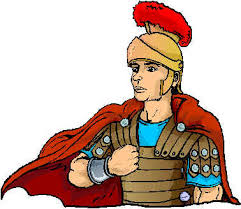 In either case, notice who is convinced by the signs – not the Jews, but common Gentile dogs! And not only Gentiles, but Roman soldiers – some of the most hard-hearted, vicious and cruel men on the earth. These soldiers had put hundreds of men to death by crucifixion. Pity and fear were emotions they did not possess. Why, only hours earlier, they had been mocking Jesus. They spit on him, struck him, pulled out his beard and jammed a crown of thorns on his head!
In either case, notice who is convinced by the signs – not the Jews, but common Gentile dogs! And not only Gentiles, but Roman soldiers – some of the most hard-hearted, vicious and cruel men on the earth. These soldiers had put hundreds of men to death by crucifixion. Pity and fear were emotions they did not possess. Why, only hours earlier, they had been mocking Jesus. They spit on him, struck him, pulled out his beard and jammed a crown of thorns on his head!
Even these 'unlearned' men are able read the signs and acknowledge that Jesus was an innocent, righteous man while the Jews were so filled with hate and envy, they could not even admit his innocence.
Matthew 27:55-56 – There were also many women there, looking on from a distance, who had followed Jesus from Galilee, ministering to him, among whom were Mary Magdalene and Mary the mother of Jesus and Joseph and the mother of the sons of Zebedee.
This group of women had been with Jesus for some time. They accompanied him on his journeys and provided money to fund his ministry:
Luke 8:2-3 - And certain women, who had been healed of evil spirits and infirmities, Mary called Magdalene, out of whom went seven demons, And Joanna the wife of Chuza Herod's steward, and Susanna, and many others, who ministered unto him of their substance.
The disciples had promised to die with Jesus, yet all of them had fled the scene, except John. How remarkable, that these courageous women faithfully followed Jesus to Calvary, and then stayed to watch the proceedings until the very end. In fact, they will be the last to leave Jesus at the cross, and the first to search for him at the tomb. As such, they became witnesses of things that the disciples did not see or hear.
Matthew 27:57-58 – When it was evening, there came a rich man from Arimathea, named Joseph, who also was a disciple of Jesus. He went to Pilate and asked for the body of Jesus. Then Pilate ordered it to be given to him.
First of all, it should be noted that the bodies of all executed criminals (Jesus is included in this category), were the 'property' of Rome. The government was responsible for disposal of the body. Pilate could have done anything he wanted with it. He could have ordered it to remain on the cross until it rotted away or the birds ate it. He could have ordered it to be tossed into a mass grave with lots of other bodies. He could have had it burnt, or dismembered or secretly buried, or any number of other things.
But in accordance with his great master plan, God had already chosen and equipped the right man to organize and carry out the funeral of his Son. That man was Joseph of Arimathea.
Joseph was actually a member of the council that sentenced Jesus to death, though he himself opposed his condemnation (Luke 23:51-51). Council membership indicates that he was a well respected man who had influence within the community. He was also very rich. More importantly, he follower of Jesus, albeit secretly.
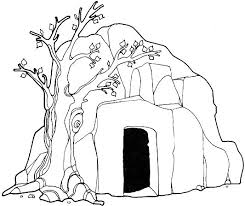 The gospel of John tells us that Joseph had a partner in the funeral – Nicodemus (John 19:39). This was the same Nicodemus that visited Jesus at night. He too was on the council that condemned Jesus. He too was a leader in Israel. Together, these two men planned and carried out a private funeral for Jesus.
The gospel of John tells us that Joseph had a partner in the funeral – Nicodemus (John 19:39). This was the same Nicodemus that visited Jesus at night. He too was on the council that condemned Jesus. He too was a leader in Israel. Together, these two men planned and carried out a private funeral for Jesus.
The character and reputation of Joseph most likely had a direct influence on the decision of Pilate in regard to releasing the body of Jesus. Because the death of Jesus caused such a public uproar, his body couldn't be released to just anyone; misuse of his body could be used to incite rioting in the city.
Pilate's decision may also, at least partially, have been based on lingering feelings of guilt for condemning an innocent man. Perhaps he thought a decent burial would in some way help atone for his crime. In any case, the request was granted and Joseph received the body.
Matthew 27:59-60 – And Joseph took the body and wrapped it in a clean linen shroud and laid it in his own new tomb, which he had cut in the rock. And he rolled a great stone to the entrance of the tomb and went away.
Let's face it – it is very unlikely that the disciples (even if they were present) could afford to bury their teacher. They had been 'out of work' so to speak, for the last three years; a group of wealthy women had been paying for their day-to-day needs. This task had to fall to someone that God had equipped for it; someone with enough wealth and influence to get the job done.
It was going to take money to prepare the body of Jesus for burial. Money was needed to transport the body, to clean it, to buy the cloth as well as the spices that were wound into the cloth.
It was also going to take money to actually bury him. Just like today, gravesites are not free. You have to pay for them. Joseph is rich enough and generous enough to donate this tomb to Jesus. This is actually another fulfillment of Old Testament prophesy:
Isaiah 53:9 - And he made his grave with the wicked, and with the rich in his death.
The tomb itself was also uniquely suited for the body of Jesus. It was not a cave; it was hewn out of rock, which meant that there were no secret doors or hidden passages that could be used by the disciples to steal the body. It had one door, which was shut by an enormous stone. In fact, blocking the entryway with the stone was the last act of the funeral.
Once that was door was shut, the living departed without any further ceremony. They went home, leaving the dead person behind.
However, it should be noted that in the case of a Christian, the opposite is true. The dead saint has actually gone home to the land of eternal living, and left us behind! May this thought give you comfort when you consider some of your deceased loved ones.
Matthew 27:61 – Mary Magdalene and the other Mary were there, sitting opposite the tomb.
These women came to the grave to see the end, and overwhelmed with sorrow and anguish sat down to mourn. How often have we done the same thing at the grave of our loved ones? And yet, as we will see in chapter 28, their mourning would soon be turned to joy at the resurrection. There will be a glorious resurrection for all those who trust in Christ!
Matthew 27:62-63 – The next day, that is, after the day of Preparation, the chief priests and the Pharisees gathered before Pilate and said, "Sir, we remember how that imposter said while he was still alive, 'After three days I will rise.'"
The phrase 'the next day' seems a bit confusing to us. It sounds like the tomb was left unguarded the first night that Jesus was dead, which would make no sense. If the disciples were going to steal the body of Jesus, they could just as easily do it on the first night, as the second.
The answer can be found when we remember that the Jews do not count days like we do. For them, each new day begins at sunset. Jesus was crucified during the day; he died around 3 pm in the afternoon. However, by the time he was buried, it was after dark. So in the reckoning of the Jews, this was technically 'the next day' after the crucifixion.
In our time line, it would be understood this way: Jesus died and was buried the same day. That evening, after or during the time of internment, the Jewish religious leaders met with Pilate to make arrangements to secure the tomb.
Matthew 27:64 – "Therefore, order the tomb to be made secure until the third day lest his disciples go and steal him away and tell the people, 'He has risen from the dead,' and the last fraud will be worse than the first."
Remember when the leaders asked him for a sign that he was the Messiah? Jesus told them to look at the sign of Jonah, who was in the belly of the fish three days and three nights (Matthew 12:39-40) before reappearing on land.
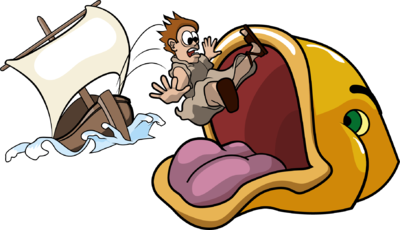 Furthermore, this once again proves that they clearly understood what Jesus meant when he said 'destroy this temple and in three days I will raise it again'.
Furthermore, this once again proves that they clearly understood what Jesus meant when he said 'destroy this temple and in three days I will raise it again'.
It is also possible that Jesus spoke of his resurrection more frequently, even though these declarations are not recorded for us in scripture.
After all, the resurrection is the lynchpin of the gospel. Everything depends on it. If Jesus does not resurrect himself, then all of Christianity is false, the kingdom of heaven is a lie, and no atonement had been made for mankind.
So the bottom line is that it was common knowledge throughout the ranks of the Jews (from the lowest shepherd to the chief priests and Pharisees) that Jesus predicted his own resurrection on the third day.
Given these universally known predictions, the Jewish leaders want to make it impossible for the disciples to steal the body and fake the resurrection of Jesus. They took stringent precautions against any kind of fraud. They were not going to allow any room for controversy regarding the death of Jesus.
How ironic that God causes them to be trapped by their own craftiness!
Because they took such overwhelmingly great care in making sure the tomb was sealed and guarded, they essentially provided an alibi for the disciples – there was no way the followers of Jesus could have perpetrated any kind of fraud in the resurrection. So the Pharisees wind up being the strongest witnesses of the very news they were hoping to suppress!
Furthermore, if they thought about it, they would have realized just how ridiculous their preparations were. If Jesus had not truly risen, and his followers stole his body to fool everyone, then they were fooling themselves too. What possible benefit could they gain by faking the resurrection? They would still know in their hearts that they were wrong; they would know that the kingdom of heaven had not really come and their faith was in vain. Why would the disciples want to spend the rest of their lives in a pointless endeavor to get people to believe a lie? Why continue a farce that would certainly end up with their own painful deaths? Had they been wrong, it would have made far more sense for them to admit the mistake and move on.
Matthew 27:65-66 – Pilate said to them, "You have a guard of soldiers. Go, make it as secure as you can." So they went and made the tomb secure by sealing the stone and setting a guard.
The purpose of the guards was to protect the tomb from any kind of invasion, such as the followers of Jesus stealing the body.
The purpose of the seal was to protect the tomb from the guards themselves, who otherwise might be tempted to take a bribe and allow the tomb to be raided.
How was the tomb sealed? We know that a large rock had already been rolled in front of the opening, so as to close it off. It is probable that ropes were then placed across the stone and each end fastened to the stone wall of the tomb with wax or cement of some kind. This wax/cement may have also been stamped with the seal of Pilate.
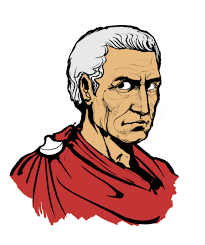
We find Pilate trying to please all sides in this matter.
He allows the friends of Jesus to have his body for a decent burial, but he also allows the religious leaders to do what they feel is in their own best interest – to guard the tomb.
What are we to make of Pilate's words, 'make it as secure as you can'?
Perhaps he is trying to pit one side against the other. No matter which side 'wins', he can claim to be on their side. He would use this as leverage to keep peace in the city.
Perhaps he has spoken with his centurion and is now convinced that Jesus was the Son of God. If he believes that, then his words may be mocking the religious leaders, because they could never secure that tomb against God himself!
Perhaps Pilate wants to remain neutral in all of this. Perhaps he wishes the whole controversy will just 'go away' without requiring him to take a side in the matter.
If so, that was a vain hope indeed. The death and resurrection of Jesus will always demand a decision from every person who walks the earth. It will demand a decision from you and from me.
What decision will you make? Is Jesus the Messiah of the world, sent by God to redeem mankind? If so, have you surrendered your life to him?
Let me offer you some encouragement:
We have all lost loved ones to the sting of death. But as we pointed out in this study, that is not the end. There will be a resurrection from the dead. Because of what Jesus accomplished on the cross, death will eventually be swallowed up in victory:
1 Corinthians 15:54 - So when this corruptible shall have put on incorruption, and this mortal shall have put on immortality, then shall be brought to pass the saying that is written, Death is swallowed up in victory.
We know that we will one day be reunited in heaven with all those who have trusted in Christ throughout the ages, where we will never be separated again.
Let me offer you some relief:
But in order to have that hope, you need to trust in Christ. You need to repent from your sin, accept Jesus into your heart, and live for him. When you do so, you will find relief from sin, fear and condemnation; there is no condemnation for those who are in Christ Jesus (Romans 8:1).
Let me offer you some strength:
Sometimes it is hard to share the gospel with those who know us best. We fear that they will reject or ridicule us. We sometimes hesitate because we know we have failed in the past, and they have seen it.
But stop for a minute and consider today's lesson. If we want to spend eternity in the company of our loved ones, then they MUST trust in Jesus for their salvation. Can we use this understanding as a catalyst to strengthen our resolve to witness to our loved ones?
I suggest this: Pray for the salvation of that loved one. Then ask for the Holy Spirit to lead you in sharing the gospel with them. Don't do it on your own power or in your own timing. If you do, the effort will likely fail. But if we let Holy Spirit take the lead, He will give you the words to say that will penetrate their heart and make Christ a reality in their lives.


